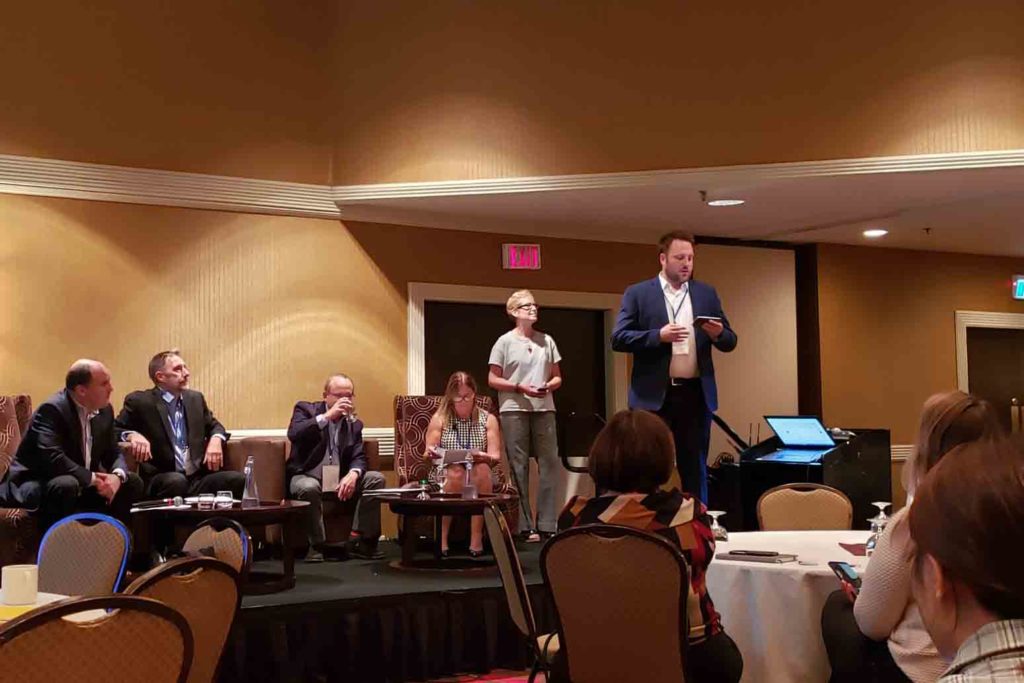 Over 80 members of Canada’s tourism research community recently gathered to network and learn about the latest tourism research from statisticians, academics, students, and destination marketers. The thought-provoking Travel and Tourism Research Association (TTRA) Canada Chapter Conference was held September 18-20 on Treaty Six land in Saskatoon, Saskatchewan.
Over 80 members of Canada’s tourism research community recently gathered to network and learn about the latest tourism research from statisticians, academics, students, and destination marketers. The thought-provoking Travel and Tourism Research Association (TTRA) Canada Chapter Conference was held September 18-20 on Treaty Six land in Saskatoon, Saskatchewan.
Statistics Canada led a workshop prior to the conference, showing how to access the highly detailed information that can be gathered from the Frontier Counts, the National Travel Survey, and the Visitor Travel Survey, as well as Tourism HR Canada’s own Rapid reSearch Tool. The afternoon saw attendees visit Wanuskewin Heritage Park for a case study on building authentic Indigenous tourism experiences.
Delegates were welcomed to the conference’s official opening by Lyndon Linklater, a traditional knowledge keeper and storyteller and a citizen of the Thunderchild First Nation in Treaty Six.
Highlights of the two-day event included keynotes from Stephen Pearce of Tourism Vancouver on how to develop a film tourism destination by working hand-in-hand with the film industry, and an inspirational discussion on how to “find your awesome” by Kerri Twigg of Career Stories Consulting.
Attendees learned about the development of Indigenous tourism experiences based on work by Tourism Saskatchewan, Glyph Creative Strategy, and Insightrix Research and the insights they have acquired.
 Some of Canada’s leading tourism researchers, including Michel Dubreuil of Destination Canada, Larry Filler of Environics Analytics, and Greg Hermus of the Conference Board of Canada, shared innovative approaches to filling in data and information gaps.
Some of Canada’s leading tourism researchers, including Michel Dubreuil of Destination Canada, Larry Filler of Environics Analytics, and Greg Hermus of the Conference Board of Canada, shared innovative approaches to filling in data and information gaps.
There were 27 breakouts on a wide range of topics, ranging from the impacts of climate change on tourism to wine tourism to overcrowding to Canadians’ sentiments towards the sector. Delegates were also able to participate in several workshops to learn about such subjects as modern brand communication and place marketing and the economic importance of tourism as displayed by the Tourism Satellite Account.
Calum MacDonald, Tourism HR Canada’s Vice President of Labour Market Intelligence and member of the TTRA Canada Board of Directors, showed delegates how to access information on the tourism sector’s labour force using data available through the Rapid reSearch Tool. This online portal allows users to pull customized data for the tourism sector from the census, labour force survey, business counts, and provincial-territorial human resource modules, as well as projections of labour supply and demand for the tourism sector.
He also presented the findings of two surveys of Canadian residents on their perceptions of tourism as an economic driver and as a place of work. The conclusion? As we grow the tourism industry, it is important that we continue to create well-paid, career-oriented tourism employment, as well as the frontline jobs that provide an entry point to the labour force.
The conference recognized the work of the next generation of tourism researchers via poster and video presentations by students from the University of Manitoba, Vancouver Island University, the University of Guelph, and Ryerson University.
The winner of the Gordon Taylor Award for Undergraduate Research was Katherine Lo of Ryerson University for her paper built on a qualitative study (based on in-depth interviews with hotel professionals) titled “Skills Gaps in the Luxury Hospitality Sector: The Case of Toronto”.
Tourism HR Canada proudly sponsored the Graduate Researcher Award, given to Brittany Lutes from the University of Guelph for her paper “You bragged I booked: an exploration of how social network behavior influences destination choice”. The research was conducted in collaboration with Tourism Nova Scotia and examined two distinct groups of social media users. She concluded that those with a tendency to conform are inclined to visit destinations that are trending within their social network, while those who tend to brag or seek out social return prefer to travel to destinations that are unique or perceived to be superior to those trending on social media.
The next TTRA International Conference will be held in Victoria, British Columbia, from June 16 to 18, 2020. The TTRA Canada Chapter Conference will return in September 2021, hosted in Kingston, Ontario.

